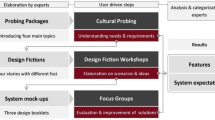Abstract
Every few years a new wave of information technology finds its way into our homes. The last few decades have seen the arrival of audio and video technology, computers and internet connectivity, home cinema, mobile phones, and other digital technologies. Each wave brings with it new complexity – a new set of concepts to understand, new issues to deal with, and new frustrations to endure in exchange for the benefits that the new technology offers. Eventually, usually, the technology is domesticated and becomes part of everyday life. In this chapter we’ll address the possibility that the next big wave of new technology to arrive in our homes will not be information-related, but energy-related. We’re going to explore the likelihood that today’s comparatively simple situation, energy-wise, will be replaced with unexpected complexity that ordinary people may struggle to manage. And we’re going to suggest that the designers of this technology are making poor assumptions about their users, and using wrong understandings of how ordinary people will react to and interact with these new products. The possibility of these products being poorly designed — at least from the point-of view of user-interaction — threatens to undermine their adoption, and to reduce the global impact that they’re intended to have.
Access this chapter
Tax calculation will be finalised at checkout
Purchases are for personal use only
Similar content being viewed by others
References
Wood, G., & Newborough, M. (2007). Energy-use information transfer for intelligent homes: Enabling energy conservation with central and local displays. Energy and Buildings 39, 495-503.
Buildings Research Establishment. (2003). Domestic Energy Factfile. Farnborough: BRE.
Chetty, M., Banks, R., Harper, R., Regan, T., Sellen, A., Gkantsidis, C., et al. (2010). Who’s Hogging the Bandwidth? : The Consequences of Revealing the Invisible in the Home. Proc. CHI 2011. ACM.
Eun-ju, L., Ji-nyoung, P., Jae-min, K., & Min-ho, B. (2009). User interface design for changing energy end-users behavior. International Association of Societies of Design Research (IASDR).
Ehrhardt-Martinez, K., Donnelly, K. A., & Laitner, J. A. (2010). Advanced Metering Initiatives and Residential Feedback Programs: A Meta-Review for Household Electricity-Saving Opportunities. Washington DC: ACEEE.
Energy Saving Trust, (2009). The smart way to display. London, EST.
Darby, S. (2008). Why, What, When, How, Where and Who? Summer Study on Energy Efficiency in Buildings (pp. 7-70 - 7-81). American Council for an Energy Efficient Economy (ACEEE).
Darby, S. (2006). The Effectiveness of Feedback on Energy Consumption. Oxford: Environmental Change Institute - University of Oxford.
Faruqui, A., Sanem, S., & Sharif, A. (2010). The impact of informational feedback on energy consumption - A survey of the experimental evidence. Energy 35 (pp. 1598-1608), Elsevier: Amsterdam.
Frost & Sullivan. (2010). The European Home Energy Monitoring Market. London.
Hargreaves, T., Nye, M., & Burgess, J. (2010). Making Energy Visible: A qualitative field study of how householders interact with feedback from smart energy monitors. Energy Policy 38, 6111-6119.
Jackson, T. (2005). Motivating Sustainable Consumption. University of Surrey, Centre for Environmental Strategy. Guilford, UK: Sustainable Development Research Network.
Janda, K. B. (2009). Buildings Don’t Use Energy: People Do. PLEA 2009 - 26th Conference on Passive and Low Energy Architecture. Quebec City, Canada.
Pierce, J., Schiano, D. J., & Paulos, E. (2010). Home, Habits, and Energy: Examining Domestic Interactions and Energy Consumption. CHI-2010 (pp. 1985-1994). Atlanta, GA, USA: ACM.
Scott, J., Krumm, J., Meyers, B., Brush, A., & Kapoor, A. (2010). Home Heating Using GPS-Based Arrival Prediction. MSR Technical Report, Cambridge, UK: Microsoft Research.
Sentec Ltd, (2006). Smart Meters for Dumb Markets. Cambridge, UK: Sentec Ltd.
Strain, J. D. (2003). Households as Morally Ordered Communities. In R. Harper, Inside the Smart Home (pp. 41-62). Springer.
The Economist (November 6th 2010). It’s a Smart World - Special report on smart systems. London, UK.
Author information
Authors and Affiliations
Editor information
Editors and Affiliations
Rights and permissions
Copyright information
© 2011 Springer London
About this chapter
Cite this chapter
Lewis, S.C. (2011). Energy in the Smart Home. In: Harper, R. (eds) The Connected Home: The Future of Domestic Life. Springer, London. https://doi.org/10.1007/978-0-85729-476-0_14
Download citation
DOI: https://doi.org/10.1007/978-0-85729-476-0_14
Published:
Publisher Name: Springer, London
Print ISBN: 978-0-85729-475-3
Online ISBN: 978-0-85729-476-0
eBook Packages: Computer ScienceComputer Science (R0)




